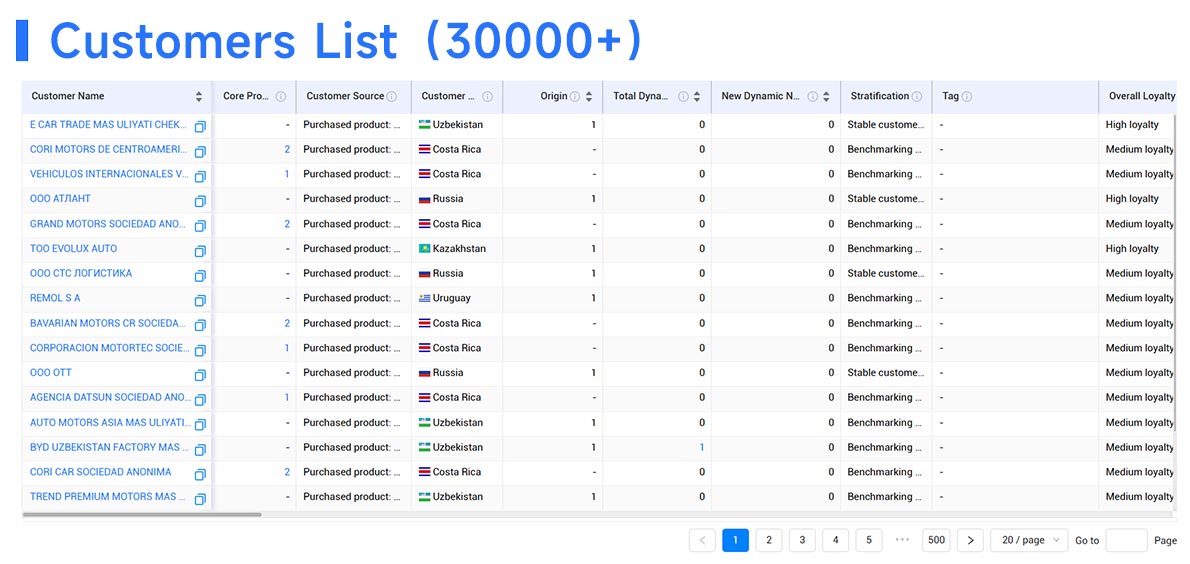 Trade Data Provider
Trade Data Provider
 29-11-2024
29-11-2024
In recent years, the global trade industry has been evolving at an increasingly rapid pace. Traditional methods of acquiring customers are facing greater challenges, particularly in the operational environment of B2B platforms such as Alibaba. Many global trade companies continue to rely heavily on a single platform like Alibaba, investing tens of thousands, hundreds of thousands, or even millions of dollars, in the hope of driving traffic and generating inquiries through sheer spending. However, as time goes by, more and more companies are realizing that this approach of solely depending on the platform often fails to deliver the desired results. In some cases, businesses even find themselves caught in a vicious cycle.

The Challenges of Using Alibaba: High Costs, Small Orders, Poor Quality
Alibaba has long been the preferred channel for global trade businesses to acquire customers. By publishing product information and piling up keywords, many companies were once able to generate a significant number of inquiries. However, with changing platform rules and intensifying competition, the quality of customers acquired through platform traffic has gradually declined. In particular, traffic gained through the P4P (pay-per-click) model often results in small orders or low-quality clients.
This phenomenon is becoming increasingly common: companies spend large amounts of money on advertising but end up with “junk inquiries” or small, direct-to-consumer (C-end) orders that fail to recoup their investments.
Some companies, encouraged by sales managers, opt for the basic or Gold Supplier membership plans but soon discover that the money they've invested hasn't delivered the expected returns. Sales representatives often claim, “If you activate P4P, you'll get more traffic and inquiries,” yet even after activating P4P, the results may still fall short. At this point, the sales team might suggest, “You need to spend more—keep spending to see results.” This continuous escalation often traps businesses in a vicious cycle of “burning money for traffic.”
The Reality of Alibaba: Valuable, But Not Sufficient on Its Own
This is not to disparage Alibaba. In fact, the platform still holds value in the global trade industry. For companies new to the trade, Alibaba's extensive visibility and reach can help establish some level of trust with potential customers. Many overseas buyers use Alibaba to search for suppliers and place trust in sellers on the platform.
However, as competition intensifies, the quality of traffic and customers on Alibaba has declined compared to the past. For small and medium-sized businesses, especially those that cannot sustain significant financial investment, the risks of relying on the platform are becoming increasingly apparent.
Alibaba remains a useful channel, but it should never be the sole customer acquisition strategy for global trade businesses. Companies that pour all their resources into Alibaba are effectively binding themselves to a single source of leads. “Those who follow may not prosper, but those who resist will surely fail.” Without the courage to innovate and explore new customer acquisition strategies, global trade companies will ultimately be left behind by the market.
The New Era of global trade: Diversified Customer Acquisition is Key
The global trade landscape has undergone profound changes. Relying on a single platform for customer acquisition is no longer viable. In this new era, global trade should be approached as an integrated process. Businesses need to diversify their presence across multiple channels to break through traffic bottlenecks and secure high-quality customers.
Here are several diversified strategies for customer acquisition that global trade companies can adopt:
1. Import and Export Data
While many people are aware of using import and export data to find clients, they often lack the know-how to use it effectively. Some businesses purchase import and export data, run a simple search by product name to generate a customer list, and send out promotional emails. This approach, however, usually yields poor results and can even lead to being flagged as spam, which risks alienating potential clients.
Import and export data is not just a directory of contact information—it is a foundation for precise customer targeting. Businesses should deeply analyze the data to identify clients that align with their product offerings and market positioning. These potential clients can then be approached through personalized outreach methods such as email, phone calls, and social media platforms. The true value of import and export data lies in helping businesses establish long-term partnerships rather than simply generating a list of contacts.
>>Explore a Free Demo of Tendata Import and Export Data<<

2. Trade Shows + Social Media (LinkedIn, Facebook, etc.)
Trade shows remain an important channel for global trade businesses to connect with customers. By participating in international trade shows, businesses can engage with clients face-to-face and build trust.
In addition, platforms like LinkedIn and Facebook allow companies to establish long-term online relationships with clients. Through content marketing, social interactions, and professional engagement, businesses can boost client loyalty and improve conversion rates.
3. Google Ads + SEO Optimization
Google Ads enable businesses to run targeted campaigns and attract potential clients. Simultaneously, SEO optimization can improve the visibility of a company's website, making it easier for clients to find the business through search engines. By increasing traffic and conversion rates on their own websites, businesses can strengthen client trust and provide more comprehensive support during the purchasing decision process.
Unlike relying on platform-generated traffic, building a strong presence through a company's own website enhances credibility and brand authority.
4. Social Media Marketing + Targeted Ads
As social media continues to grow in influence, platforms like Facebook and Instagram have become crucial tools for global trade businesses. Companies can showcase their expertise and product advantages by publishing content, optimizing company pages, and participating in industry discussions.
Targeted advertising (e.g., Facebook Ads, Instagram Ads) also helps businesses precisely identify potential clients, improving customer acquisition efficiency.
Conclusion: Embrace Diversification to Succeed
In today's increasingly competitive global trade industry, relying solely on one platform like Alibaba can lead to traffic bottlenecks and poor order quality. The key to success lies in embracing a diversified customer acquisition strategy that includes platforms, import and export data, social media, trade shows, and more. By establishing a presence across multiple channels, businesses can achieve sustainable growth in different market environments.
Category
Leave Message for Demo Request or Questions


 T-info
T-info T-discovery
T-discovery

 My
Tendata
My
Tendata Market Analysis
Market Analysis Customer
Development
Customer
Development Competitor
Monitoring
Competitor
Monitoring Customer Relationship
Customer Relationship





































































































































